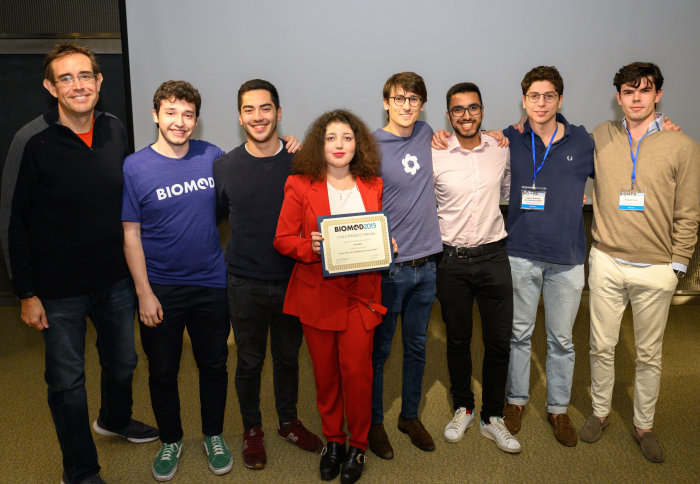Cancer drug delivery award and renewable campuses: News from the College

Here’s a batch of fresh news and announcements from across Imperial.
From a student award for a novel cancer drug delivery system, to renewable electricity on all Imperial campuses, here is some quick-read news from across the College.
Improving cancer drug delivery
 A team of Imperial students has won second place in an international biomolecular design competition, BIOMOD, hosted in San Francisco.
A team of Imperial students has won second place in an international biomolecular design competition, BIOMOD, hosted in San Francisco.
Traditionally, chemotherapy drugs are administered directly into veins and circulate freely throughout the body. As well as cancer cells, this inevitably also kills healthy cells, leading to some of the unwanted side effects. High doses also desensitise cancer cells, potentially leading to drug resistance.
Team NanoDIPS’ solution is to package drugs within small nanoscale bubbles containing a DNA nanopore (a small channel). The nanopore responds to the presence of cancer-associated proteases, enzymes that break down proteins, in the immediate vicinity of the tumour, selectively releasing the drug to kill cancer cells.
They hope that their cancer drug delivery system could minimise the tendency towards drug resistance and side effects of future chemotherapy treatments.
FCA appointment
 Professor Tommaso Valletti from the Business School has been appointed to the board of the UK’s Financial Conduct Authority (FCA).
Professor Tommaso Valletti from the Business School has been appointed to the board of the UK’s Financial Conduct Authority (FCA).
He will serve a three-year term as a Non-Executive Director, helping to improve the way financial markets work and how firms conduct their business.
The FCA is the conduct regulator for 59,000 financial services firms and financial markets in the UK, and the prudential regulator for over 18,000 of those firms.
Professor Valletti’s main research focusses on industrial economics, regulation and telecommunications. He recently served as Chief Competition Economist at the European Commission where he led economic investigations involving digital platforms including Google, Apple, Amazon and Facebook.
Objective unfairness
 In theory, machine learning should enable more accurate and precise credit approvals – yet there is a tendency to amplify pre-existing biases.
In theory, machine learning should enable more accurate and precise credit approvals – yet there is a tendency to amplify pre-existing biases.
A new IB Knowledge article examines the effect of machine learning on mortgage lending decisions in the US, which found important disparities between winners and losers, suggesting that concerns about unequal effects are indeed valid.
Read the full article: ‘Objective unfairness: the impact of machine learning on mortgage lending approvals’
Celebrating female physicists
 Alumnus Dr Hannah Williams was one of two runners up for the Institute of Physics’ 2019 Jocelyn Bell Burnell Medal and Prize. Awarded annually for exceptional early-career contributions to physics by a very early career female physicist, the award also recognises outreach in physics.
Alumnus Dr Hannah Williams was one of two runners up for the Institute of Physics’ 2019 Jocelyn Bell Burnell Medal and Prize. Awarded annually for exceptional early-career contributions to physics by a very early career female physicist, the award also recognises outreach in physics.
Dr Williams completed her undergraduate degree and PhD at Imperial, and took up her first postdoc role here. She left Imperial last month to take up a role at the Institut d'Optique in Paris. Dr William’s research has focused on developing techniques to cool, trap and control molecules. At the Institute of Physics event, she presented some of her results showing control over the quantum state of a group of molecules and cooling them to 0.000005 degrees above absolute zero.
Dr Williams also spoke about being part of the organising team behind Gamechangers for Diversity in STEM, a two-day event aimed at changing the culture within research.
Reducing emissions
 All bought-in electricity on Imperial campuses now comes from renewable sources. The change, which happened on 1 October 2019, follows a number of other moves by the College to increase sustainability such as an end to single-use plastic glasses in catering outlets, the introduction of a coffee cup levy and reusable wooden cutlery.
All bought-in electricity on Imperial campuses now comes from renewable sources. The change, which happened on 1 October 2019, follows a number of other moves by the College to increase sustainability such as an end to single-use plastic glasses in catering outlets, the introduction of a coffee cup levy and reusable wooden cutlery.
Dr Neil Jennings from the Grantham Institute, said: “Moving to a 100 per cent renewable electricity provider helps us reduce our carbon emissions and shows our support for the clean energy sector. It’s a really positive step forward but there is still lots to do.”
–
Want to be kept up to date on news at Imperial?
Sign up for our free quick-read daily e-newsletter, Imperial Today.

Article text (excluding photos or graphics) © Imperial College London.
Photos and graphics subject to third party copyright used with permission or © Imperial College London.
Reporter
Madeleine Stone
Business School
Laura Singleton
Communications Division
Alix Goodwin
Academic Services
Rhys Purtill
Campus Services
Joanna Wilson
Communications Division
Elizabeth Nixon
Communications Division
Andrew Youngson
Communications Division